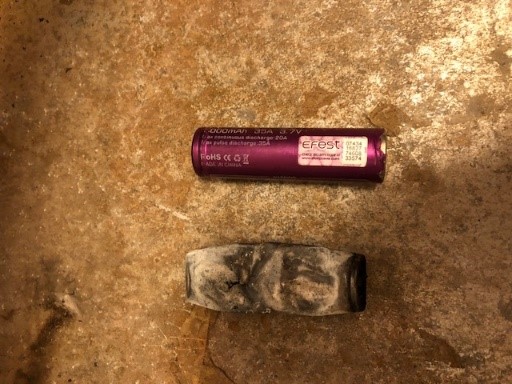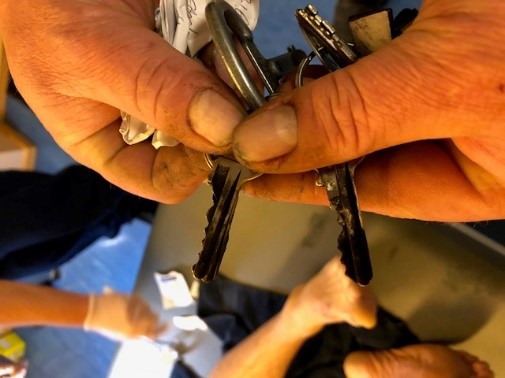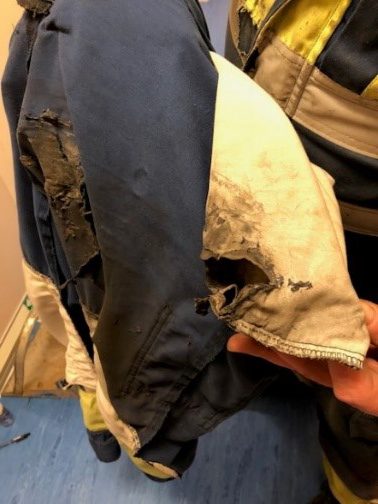LTI: Severe burn from short circuited Li-Ion battery
What happened?
A crew member suffered severe burns when a Lithium-Ion battery on his person exploded and caught fire. The crew member was about to do the last task of the shift. He picked up a set of keys and a spare battery for his vaporizer from the table and put them in his pocket. He heard a loud bang and surprised, looked around to see the origin of the sound, and only then finding out that he was on fire. A motorman working nearby came to his aid and together they managed to get his boiler suit off. They saw the burning battery on the deck and stamped out the fire. Further assistance was called, and first aid was applied. The injured person was medevac’d shortly after to a shore-based hospital, where he was treated for 10 days before being repatriated to his home and undergoing further treatment.
What was the cause?
The metal keys created a short circuit with the battery. Carrying the battery in his pocket with the keys enabled the keys to provoke a ‘thermal runaway’ by either puncturing the outer shield or by making a connection between the plus and minus layers; the exact cause could not be determined conclusively.




What went wrong?
The crewman was carrying the Li-Ion battery loose in his pocket together with metal keys. This caused a short circuit of the battery and initiated a ‘thermal runaway’, which caused the battery to burst explode into flames.
When he picked up his belongings, he stated that he was not even aware of the battery being amongst his belongings, he just scooped it all into his pocket.
Our member noted that the following:
- There was no box used for carrying the Li-Ion battery;
- The safety warning provided was only the one actually written on the battery. No information had been provided by the supplier of the equipment of which the battery was a part.
Actions taken, and lessons learned
Lithium-Ion batteries, which are more and more common in devices used onboard, are not controlled properly and it cannot always be expected that the proper and correct information has been provided by the supplier.
Lithium-Ion batteries sometimes come in size and design similar to ‘AA’ sized batteries and as such can be easily confused with a normal alkaline battery, and thus the risk associated is also confused.
Our member prohibited the carrying of loose Lithium-Ion batteries whilst at work, added appropriate issues and precautions to the vessel induction information displayed onboard, and ensured that a check was made by stewards during cleaning of cabins in order to identify batteries being charged unattended.
Members are recommended to:
- Ensure that all persons are properly informed about the hazards associated with Lithium-Ion batteries. This should include the charging, handling and storage and the risk associated with carrying the batteries loose in pockets;
- Consider more thorough control of small personal electronic devices using Lithium-Ion batteries.
Members should review the following incidents:
- Fire in the accommodation: electronic items in cabins
- Laptop battery fire (October 2017)
- Fire in vessel accommodation – Overheating notebook computer (September 2016)
- Mobile phone charger failures (June 2016)
Safety Event
Published: 18 December 2018
Download: IMCA SF 28/18
IMCA Safety Flashes
Submit a Report
IMCA Safety Flashes summarise key safety matters and incidents, allowing lessons to be more easily learnt for the benefit of all. The effectiveness of the IMCA Safety Flash system depends on Members sharing information and so avoiding repeat incidents. Please consider adding [email protected] to your internal distribution list for safety alerts or manually submitting information on incidents you consider may be relevant. All information is anonymised or sanitised, as appropriate.
IMCA’s store terms and conditions (https://www.imca-int.com/legal-notices/terms/) apply to all downloads from IMCA’s website, including this document.
IMCA makes every effort to ensure the accuracy and reliability of the data contained in the documents it publishes, but IMCA shall not be liable for any guidance and/or recommendation and/or statement herein contained. The information contained in this document does not fulfil or replace any individual’s or Member's legal, regulatory or other duties or obligations in respect of their operations. Individuals and Members remain solely responsible for the safe, lawful and proper conduct of their operations.
